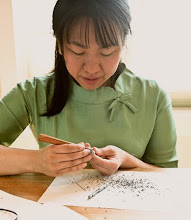This was the first picture of us taken in the US. We just stepped out from INS/customs at SeaTac Airport. We came from Manila, Philippines to Seattle in August/1986. We immigrated from Vietnam to the US as refugees in 85/86. My uncles were smuggled out of Vietnam after the fall of Saigon and made their way to the US. They later sponsored us to come, the process took about 6 years. We flew from from Vietnam to Thailand and spent about a week there in a refugee processing facility. Medical check ups and background checks were made. It was very scary getting "processed", as a personal experience of a 6 year old, it felt dehumanizing. People should never have medical checkups without having a native interpreter around. Imagine a naked 6 year old standing in front of a nurse and doctor as they do their thing, without her mother by her side. You wore an ID tag around your neck, there was little to no eye contact. They spoke at you, not to you... half the time not in a language you understood. I don't think things are like this anymore... hopefully they've changed. For those of you who think English should be the only language (in the US) needs to realize that immigrants have made some of the BEST AMERICANS and there's always a transition time when both languages are necessary.
The Thailand refugee camp was an interesting experience. The camp was built like a prison with barbed wire, tall fences and gates. There was no privacy, but this was for temporary holding so they can verify who you were and made sure you didn't have any communicable diseases. People were denied entry to the US for being a communist or if they had Aids, TB etc. There was a shop in the camp and peddlers could still sell you gum and candy through the camp's perimeter, if you had the money to buy. I remember this was the first time I had Chicklets. I was hooked, mmmm Chicklets! I believe there were 2 meals a day and you slept on cots or on blankets in a big gymnasium type room next to your luggage. We jokingly said the food was cabbage soup and rice or rice and cabbage soup. To this day the smell of boiled cabbage brings me back to this place! Despite everything it was a fond and exciting memory.
We lived with my grandmother in Vietnam, extended family often live together. We were split up for the first time in Thailand, my grandmother went directly to the US and we were diverted to the Philippines Refugee Processing Center in Bataan. We lived there for about 8 months. We think it's because my mother was a native Vietnamese and she had tested positive for TB antibodies. They worried my mother might be contagious. She took care of an aunt with TB when she was younger and I guess got antibodies from that experience. After leaving everyone I knew in Vietnam it was very hard leaving my grandmother too. This was someone who've been with me my entire life, there everyday with me and ate every meal with me. After 8 months apart this was the first time I saw her again.
Right to left: Dad (Ton Chau), mom (Hoa Nguyen), me, grandma (Hao Ly)
I just found this awesome blog about the PRPC!
http://bataan-prpc.blogspot.com/




9 comments:
that process sounds just unbearably scary and stressful. i'm so glad you and your family made it here and i hope you all continue to think it was worth the work.
great post. it's always inspiring to hear of other's stories about coming to the united states, and a great reminder to be thankful for all I have here thanks to my parents who also immigrated from vietnam years ago.
That's an incredible story Diem. I can't imagine experiencing that at such a young age. You were a brave girl, and now as a strong woman. Thank you for sharing this piece of your life.
Reading your post reminded me of an old friend who left Vietnam in '76 and came to WA state via Thailand. What you wrote about language barriers and one's need to both understand and be understood was powerful.
Thank you so much for sharing this experience! I'm always interested in the immigration stories that people have. It is so unfortunate that having a native interpreter isn't standard in all sorts of situations.
The hard experience of your life.I read very interesting your history. Thanks you.
Saluts
I was there from 3/86 to 8/86 too. The man in the picture wears the CMHS (Community Mental Health Services) t-shirt that was given to the Paraprofessional who graduated from the 3 months training program. I was one of them too. We were the selected few to go through the program and worked along the side of psychologists and psychiatrists as translators and assistants. On the back of the t-shirt it says "Everybody is a holy place".
Thank you for stopping by the blog Anon. That man is my father, he served as a translator at the camps. His English wasn't very good, but passable and he was fluent in Cantonese, Vietnamese and knew a few phrases from other languages as well. He was an architect in Vietnam before the war.
I regret not keeping more momentos from that time in our lives. We had so little, everything was worn to death or given away to others who needed it more. I don't think we left the PRPC with more than the clothes we wore and some photographs.
p.s. I hope you are doing well where ever you are!
Post a Comment